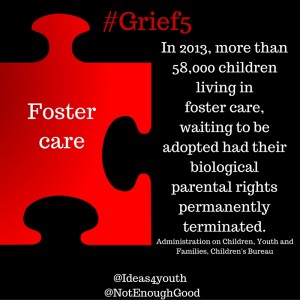We remove them from their homes with promises of a better life. We elude them with dreams of safety and a life free from the trauma and pain that often silences the voices of this population of children and teens living in foster care.
Often, key players in the lives of foster care youth struggle to understand the magnitude of loss a child or teen in the foster care system has experienced. Abuse and neglect. Loss of innocence. Trauma. Separation from parents. Loss of security. Multiple placements. These heavy experiences not only impact children and teens in our foster care population short term, they are far reaching. The long term impacts of these experiences of foster care youth are evidenced by the staggering statistics of foster care alumni. Homelessness. Crime. Unemployment. Mental health concerns. Lack of education. These are a few of the many issues that continue to impact foster care alumni  today.
today.
In order to effectively serve this underserved population it’s time for us to acknowledge how much we really don’t know about foster care youth in the United States today. It’s time to create more conversation about the needs of children and teens in foster care placement and the realities of their experiences. It’s time we meet them where they’re at in their grief.
Below is the first video in our series highlighting best practices for teachers and other key players impacting the lives of grieving foster care youth today. In this video I interview Evangelina Reina, LCSW, Assistant Regional Administrator for DCFS – Los Angeles and Adjunct Assistant Professor for The University of Southern California. Reina offers her insight into best practices when working with children and teens in foster care placement as well as her expertise on what sets foster care youth apart from youth impacted by the other experiences of death, divorce, parental incarceration, and parental deployment.
November 19th, I will be hosting a twitter chat to discuss best practices when working with grieving youth. Leading up to this twitter chat, I will continue to post more information and highlight our campaign using the hashtag #Grief5. You can see images from the hashtag campaign on Twitter, Pinterest and Instagram here.
In the meantime, use our hashtag #Grief5 to share our information, start your own conversation, and follow our campaign for updates. You can find us on Facebook at The Alliance for Positive Youth Development and The SISGI Group. On Twitter we are @NotEnoughGood and @Ideas4youth. We are also @Youth4change on Instagram.
To see all the videos in the series please view the playlist on our ISC Youtube channel.



2 pings